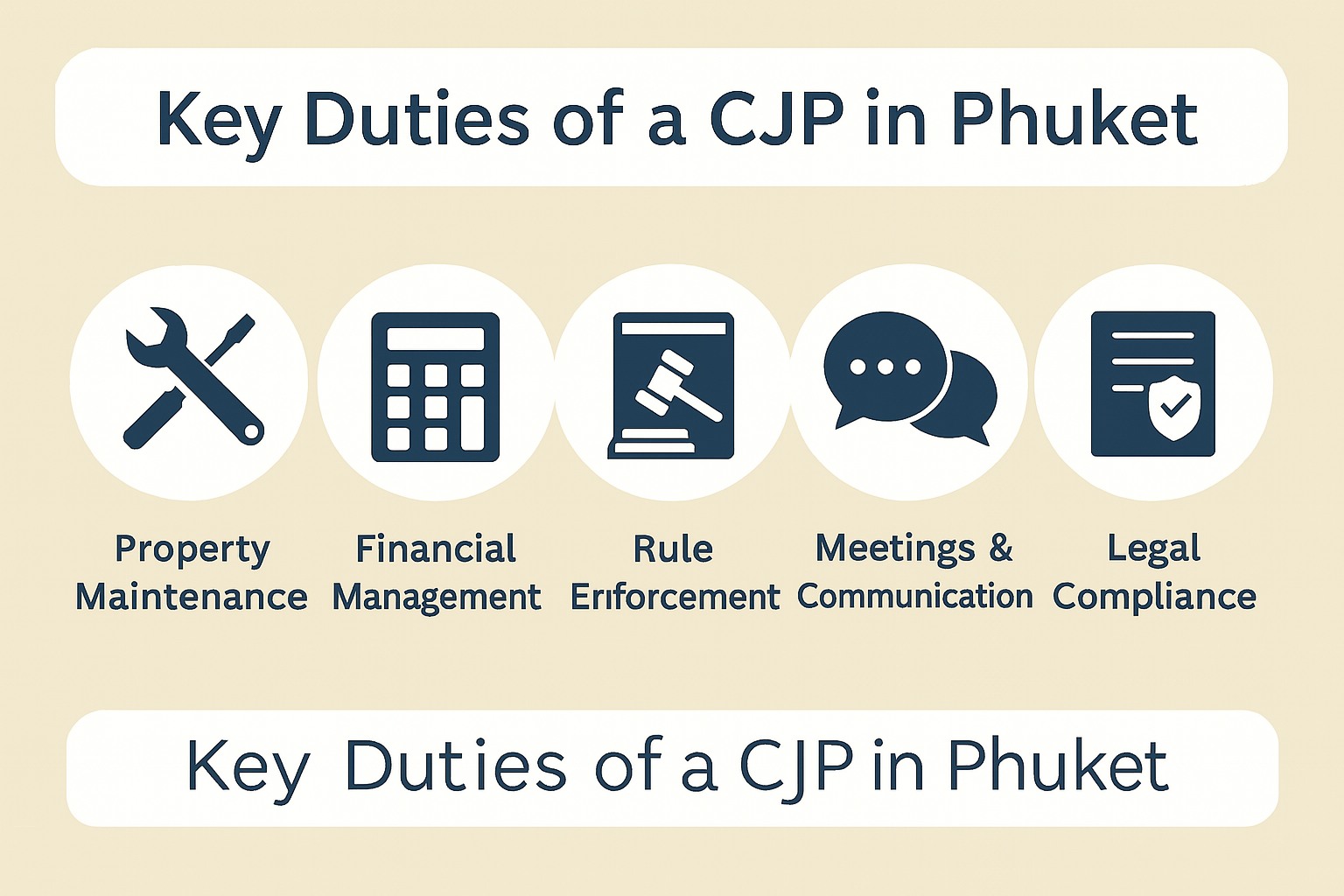When owning a condominium in Phuket, one of the most important entities you’ll deal with is the Condominium Juristic Person (CJP). This is the legal body responsible for managing the building, its finances, and its common areas on behalf of all owners.
Understanding how the CJP works is essential. Whether you live in your unit full-time, rent it out, or hold it as a long-term investment, the CJP ensures the building is properly maintained and that rules are enforced for the benefit of all co-owners.
What Is a Condominium Juristic Person?
The Condominium Juristic Person is a registered legal entity under Thai condominium law. Once a project is completed and registered, the CJP is established and takes over responsibility for day-to-day management.
Its duties include:
-
Maintaining common property such as lobbies, corridors, swimming pools, gardens, and gyms.
-
Collecting common area management fees (CAM fees) and allocating budgets.
-
Enforcing building regulations to ensure harmony among co-owners.
-
Representing the building in legal and administrative matters.
-
Hiring and supervising property managers and staff.
The CJP is overseen by a committee elected by co-owners, who vote at annual general meetings (AGMs) to approve budgets and policies.
Key Responsibilities of a CJP in Phuket
-
Maintenance & repairs: Overseeing all common-area upkeep – pools, gardens, lifts, corridors, lobbies, parking, and building systems.
-
Staff management: Hiring and supervising cleaners, security, technicians, and admin personnel (or managing third-party vendors).
-
Budgeting & finance: Preparing the annual budget, collecting monthly common-area fees, managing the sinking fund, and ensuring transparent reporting.
-
Legal compliance: Ensuring the building complies with the Condominium Act, safety standards, fire codes, and municipal regulations.
-
Resident relations: Communicating with co-owners, handling complaints, mediating disputes, and enforcing building rules and regulations.
-
Insurance & contracts: Arranging appropriate property and liability insurance and negotiating/overseeing service contracts with external providers.
Common Fees and the Role of the CJP
Every Phuket Condominium Juristic Person collects CAM fees and manages the sinking fund on behalf of co-owners:
-
CAM Fees – charged per square metre of the unit, covering routine management, cleaning, and utilities for shared areas.
-
Sinking Fund – a one-off or occasional contribution towards major repairs such as repainting, roof replacement, or lift upgrades.
-
Special Assessments – if unexpected costs arise, the CJP can request additional payments from co-owners.
Transparent financial management is a core responsibility of the CJP. Owners should ensure budgets are circulated before AGMs and that audited accounts are available for review.
Why a Phuket Condominium Juristic Person Matters for Owners
The CJP is the mechanism that ensures your investment retains value. Without it, buildings would quickly deteriorate, disputes would increase, and resale potential would suffer.
Foreign owners (and prospective owners) should always check:
-
That the CJP is legally registered.
-
How fees are calculated and collected.
-
The health of the sinking fund.
-
Whether audited accounts are provided annually.
For a secure long-term ownership option, many buyers consider foreign freehold condominiums in Phuket, which allow direct title ownership under Thai law and come with clear protections overseen by the CJP.
Red Flags to Watch Out For
-
Poor maintenance of common areas
-
High staff turnover
-
Frequent disputes among owners
-
Lack of financial transparency
-
Irregular committee meetings or weak communication
These may indicate the CJP isn’t fulfilling its obligations properly and could lead to higher costs or reduced building standards over time.
Legal Framework
CJPs operate under the Condominium Act B.E. 2522 (1979), with amendments providing more detailed obligations and protections for owners.
For official guidance, see the Thai Department of Lands, which regulates condominium registration and management nationwide.
Summary: The Role of the CJP in Phuket
A Phuket Condominium Juristic Person (CJP) is one of the most important entities you’ll deal with when owning a condo. This legal body manages the building, its finances, and common areas on behalf of all owners.
-
The CJP protects shared interests of all owners.
-
It collects fees, enforces rules, and ensures common property is properly maintained.
-
A healthy, transparent CJP is critical to preserving property value.
-
Foreign owners should pay close attention to the CJP’s registration, financial management, and governance.
FAQ: Phuket Condominium Juristic Person
Q: Who controls the CJP?
The CJP is overseen by an elected committee of co-owners, with decisions made at annual general meetings.
Q: How are fees calculated?
Fees are typically based on the square metres of your unit and approved annually by the AGM.
Q: Can the CJP stop me from renting my unit short-term?
Yes. If building regulations prohibit daily or weekly rentals, the CJP has the authority to enforce these rules.
Q: What happens if I don’t pay my CAM fees?
The CJP can take legal action, impose fines, or even restrict services until arrears are cleared.
Related Guides
Conclusion
The Condominium Juristic Person is central to condominium ownership in Phuket. It ensures that buildings are well maintained, finances are properly managed, and all co-owners’ interests are protected.
For foreigners, understanding the role of the CJP is essential for long-term, well-managed ownership. A strong, transparent CJP not only safeguards your lifestyle but also protects the long-term value of your investment.
Disclaimer: The information contained in this article is provided for general informational purposes only and does not constitute legal, financial, or investment advice. While every effort has been made to ensure accuracy at the time of publication, property laws and regulations in Thailand are subject to change. Readers should always seek independent legal advice from a qualified Thai lawyer before making any property-related decision or transaction.


Social Contact